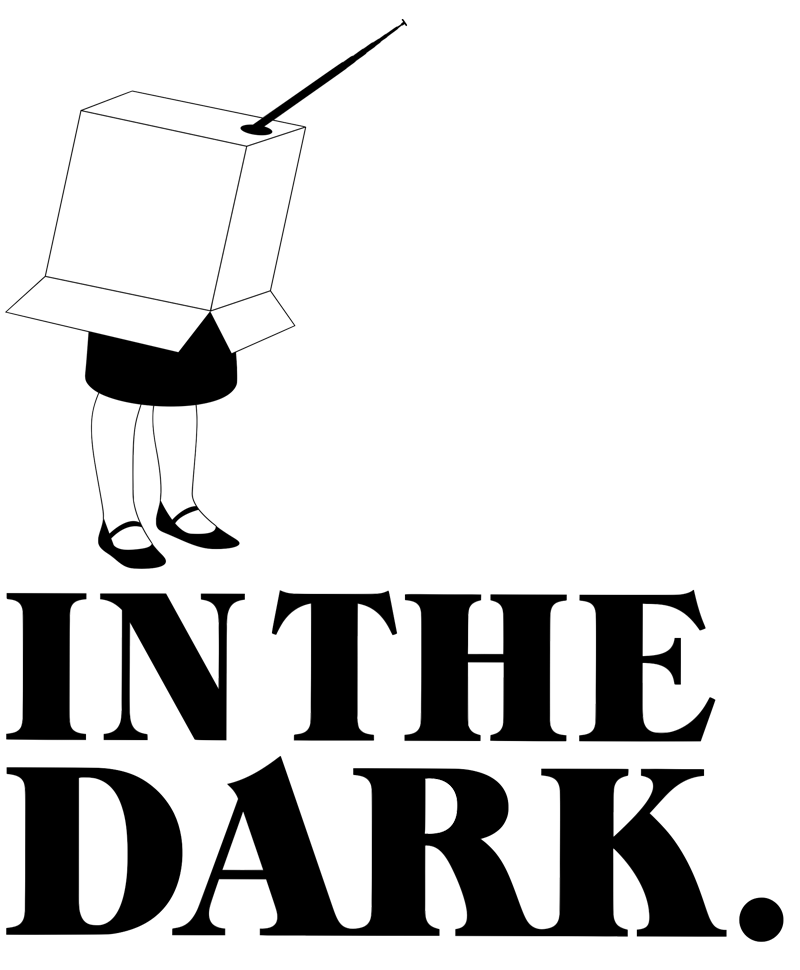Issue #8
Our Winter gift just for you, friends of In The Dark, is here! And it’s a bumper issue to curl up with on the dark evenings. There is much poetry in place – cities, villiages, the cosmos. And there is poetry in time – with thirty years of radio features, over five weeks. If it’s too cold to cycle, just go there with your ears…
Poetry of Place
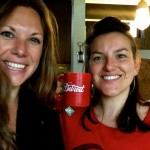 When In The Darkists of Antwerp, Berlin, and Bristol were to cross paths in Detroit, there was only one thing for it. The theme: Poetry of Place. Our crew knows radio well of course, so this local public radio interveiw was second-nature. Local collective the Smitten Mitten joined in too, taking the plunge with their first ever public listening. An event on this theme could hardly happen without some influence of Poetry, Texas, but you’re such an earudite Friend of In The Dark, that we will give you something new, another magical piece made by our own Katharina Smets, at an anatomical museum in Paris.
When In The Darkists of Antwerp, Berlin, and Bristol were to cross paths in Detroit, there was only one thing for it. The theme: Poetry of Place. Our crew knows radio well of course, so this local public radio interveiw was second-nature. Local collective the Smitten Mitten joined in too, taking the plunge with their first ever public listening. An event on this theme could hardly happen without some influence of Poetry, Texas, but you’re such an earudite Friend of In The Dark, that we will give you something new, another magical piece made by our own Katharina Smets, at an anatomical museum in Paris.
Manchester Literature Festival

Scheveningen prison by Jvhertum (Own work) [Public domain], via Wikimedia Commons
Benjamen Walker believes in the transformative power of books to redeem the human soul. When he learned that Slobodan Milosevic was reading voraciously in his cell at the Hague, while remaining remorseless through his trial for war crimes, he came to the only possible conclusion – Milosevic isn’t reading the right books.
Walker sets out for the Netherlands, armed with the books that he believes will teach bring Milosevic awareness of his actions – and dreams of the results. Listen.
Two Wheels Good
After a plane to Detroit, time to get pedalling. The idea behind Two Wheels Good came to us exactly where you’d expect it would – on a bicycle. It seems like so many radio producers cycle and most are obsessed with bikes; maybe it’s just because they sound so good. Because of this, we had a healthy amount of audio to whittle down to the best pieces.
It all came together one November evening at a trendy cycling shop/cafe-bar in east London called Look Mum No Hands. Beneath the bike wheels and photos of famous cyclists past and present, around 60 people sat and listened to audio themed around the joys of riding on two wheels. There was a great moment during the event when a police car’s blue flashing lights refracted through the window and across the wall everyone was facing, creating a brilliant light show to accompany the audio.
Curator Andrea Rangecroft choses the following piece: Choir Boy from Love + Radio.
Deep Space Radio
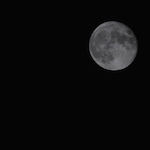 Planes, trains, bikes – piffle to our Bristol crew. No, they went all the way to outer space. The day the ESA landed a probe on a speeding comet, they gathered in Bristol’s planetarium. You probably know our fave They’re Made Out of Meat from The Truth, so here’s something you may not have heard before: Karl James, aka The Dialogue Project, had this conversation with astronaut Jean-François Clervoy. The event was then reviewed in local entertainment magazine Bristol 24/7.
Planes, trains, bikes – piffle to our Bristol crew. No, they went all the way to outer space. The day the ESA landed a probe on a speeding comet, they gathered in Bristol’s planetarium. You probably know our fave They’re Made Out of Meat from The Truth, so here’s something you may not have heard before: Karl James, aka The Dialogue Project, had this conversation with astronaut Jean-François Clervoy. The event was then reviewed in local entertainment magazine Bristol 24/7.
Bristol’s Mair Bosworth writes: Deep Space Radio was our most ambitious event yet. We were bowled over by the response – with more than 90 people coming out to pack the silver globe of the planetarium at the At-Bristol science museum. When the lights first went down and the stars lit up above our heads there was a massive gasp and trail of oohhs and ahhhs and we launched off into space. Our show included short pieces and extracts from Storycorps, the TED Radio Hour, The Dialogue Project, Radiolab, Radio 4’s Soul Music and This American Life – tales of lonely astronauts, of asteroid hunters in Wales, of building a planetarium in the backyard, of falling in love whilst making a mixtape for extraterrestrials and how seeing the earth from space changes everything. Through the set, our eyes grew more accustomed to the dark and more stars revealed themselves. There was something quite special about being immersed in these stories and soundscapes in such a special venue. As the last story played out, we hit the planetarium’s ‘spin’ button and the stars began to turn above our heads – an unnerving sensation as it feels as if the room itself is moving – and we listened to an astronaut describing his awe at watching the sun ‘come up’ from space. As the lights came up we had a big room of smiling faces.
HearSay Festival
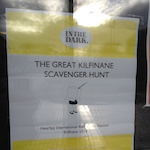 Back on the humble aircraft, right back down to earth – but still up a mountain. The HearSay International Audio Festival was unique and beautiful. They’re calling it the Woodstock for radio. Our Bristol crew readjusted their eyes to daylight, only to spend the weekend busily running a sound scavenger hunt in the village of Kilfinane and environs. They set a challenge to anyone present to record up to five sounds, which the team then composed into a delightful profile of the place and time. Their reporters, out gathering the sounds, had a pile of Prix Italia, Europa, and more, between them. The combination led to this funny and sincere piece:
Back on the humble aircraft, right back down to earth – but still up a mountain. The HearSay International Audio Festival was unique and beautiful. They’re calling it the Woodstock for radio. Our Bristol crew readjusted their eyes to daylight, only to spend the weekend busily running a sound scavenger hunt in the village of Kilfinane and environs. They set a challenge to anyone present to record up to five sounds, which the team then composed into a delightful profile of the place and time. Their reporters, out gathering the sounds, had a pile of Prix Italia, Europa, and more, between them. The combination led to this funny and sincere piece:
History of Radio Features at British Library
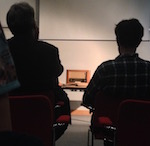 And another long haul – though time. London event organiser Rosanna Arbon brought together fine historians of broadcasting, the curators at the British Library, and our own event magic, for a five-event series in London. The audio is in a complicated copyright situation, so we have dug out the tiny fraction that we can find already online, and invited the curators to write about their first – very ambitious – go at group listening events.
And another long haul – though time. London event organiser Rosanna Arbon brought together fine historians of broadcasting, the curators at the British Library, and our own event magic, for a five-event series in London. The audio is in a complicated copyright situation, so we have dug out the tiny fraction that we can find already online, and invited the curators to write about their first – very ambitious – go at group listening events.
Amanda Wrigley, Research Fellow, University of Westminster:
What a privilege it has been to work with In the Dark and the British Library on bringing some really rich examples of long-form feature programmes, first broadcast by the BBC in the 1940s and 1950s, out of the archives and into our ears and imaginations! Over the past couple of months there have been public experiments in listening taking place in a room tucked away at the back of the British Library in London. Richly varied groups of In the Dark regulars, poetry enthusiasts, students, radio producers (veteran and current), academics, etc grew in size at each event, as word spread that something unusual and special was afoot. We sat in semi-darkness for much longer than we thought possible, (re-)learning the discipline of listening together, enraptured by some of the finest work written and composed and produced in the ‘golden age’ of the BBC Features Department. Much of it was concerned with war, one way or another, from the poignancy of D. G. Bridson’s The March of the ’45 and David Jones’ In Parenthesis to the more literary treatments of Edward Sackville-West’s The Rescue and Louis MacNeice’s The Dark Tower (both with scores by Benjamin Britten), but joie de vivre abounded in last week’s culminating event, Dylan Thomas’ Under Milk Wood. That these richly powerful works for radio not only entertained but also engaged the audience was evidenced by how most stayed on to contribute valuable observations and thought-provoking questions to the informal discussion which followed. For me, as one of the curators of the series – alongside Hugh Chignell of Bournemouth University – it has been hugely exciting to explore these works afresh with others, many of whom are hearing them for the first time. The experience of listening together, in public, really does bring a significant new dimension to the experience – one which I shall be working hard to repeat with more ‘public listenings’ in the future! Read more about the works heard in this series at publiclistenings.wordpress.com.
Professor Hugh Chignell of Bournemouth University:
The five listening events at the British Library was very much an experiment for In The Dark, the British Library and the academics involved. I was confident that the brave people who came along to listen to some quite obscure radio would probably enjoy the experience but we had no idea who would come and whether they would engage in discussion afterwards. In fact the audiences started at about 20 and then grew to closer to 50. As for the discussions these were, for me at least, very interesting and illuminating. The first feature we listened to was D.G.Bridson’s The March of the ’45; a very early verse drama which impressed the audience. One former BBC producer praised it as a great technical achievement and that technical question of ‘how did they do it’ was often asked. Someone else drew a comparison between Bridson’s verse and modern Spoken Word performance and another linked the verse to Ezra Pound’s ‘Cantos’. Following the 1943 production of The Rescue, perhaps less well known than the others, the discussion ranged once again over technical issues, including the number of studios used, to the message of the programme and the quality of the music. There was often someone at the discussions who had a particular interest in the work and some expertise, like the PhD student studying Louis MacNeice who came to hear MacNeice’s The Dark Tower, and they could often teach us all something.
Everyone involved in these listening events is determined to repeat the experience and to work again with our new friends at In The Dark without whom this would not have been such a success.
